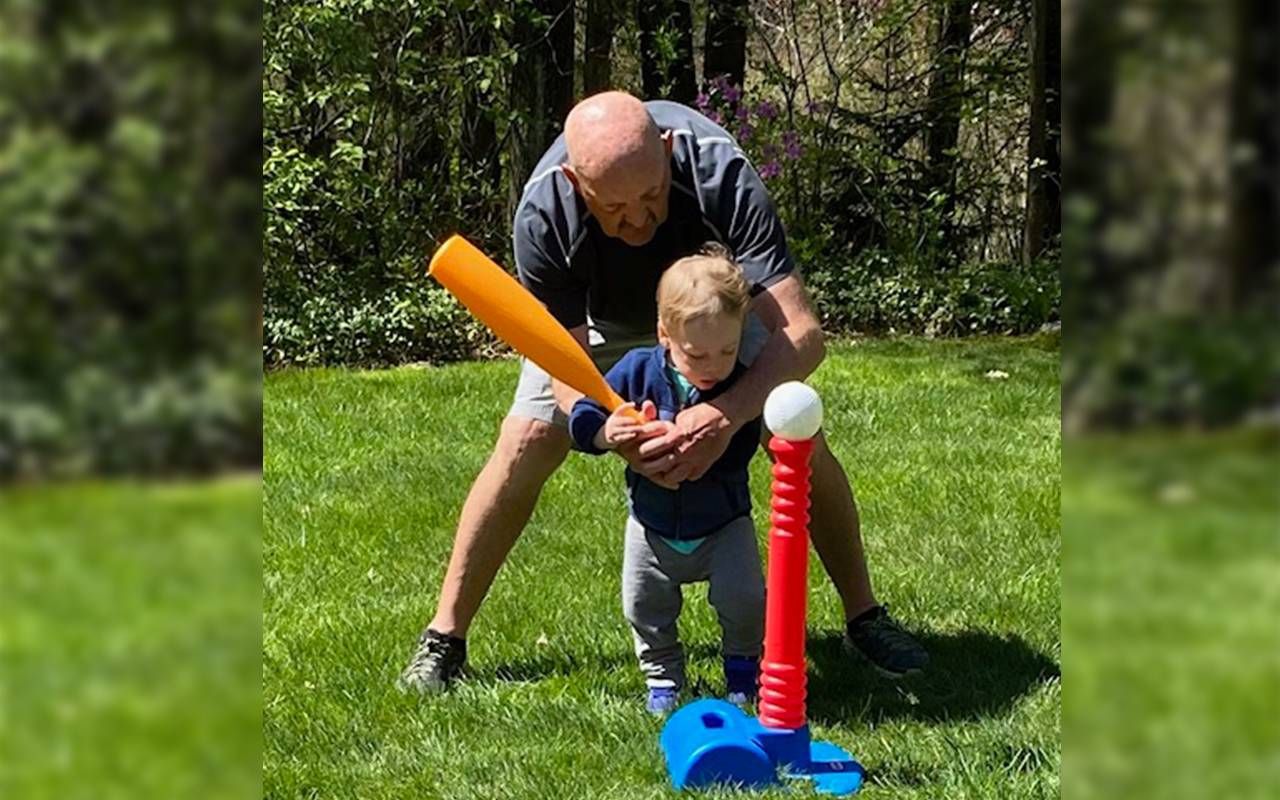Rx for Grandparents: Play With Your Grandkids
As I play with my granddaughter Lucia, everything old suddenly feels new. Research shows that both of us are reaping benefits from our play time.
Here we go again, our five-year-old granddaughter Lucia and I, playing together and getting all physical. You name it, we'll do it: skip through a park, climb hills in her backyard, jump over puddles along the sidewalk, wrestle on the floor. And that's only a single morning. Soon I'll be ready for a long nap.

It's a given that teaming up for physical activity with your grandchildren is good for your health. Recent research suggests as much, too, though the topic remains little studied. One study showed that half of grandparents who directly interacted with grandchildren were more likely to be alive five years later than those who remained uninvolved. Another study concluded that grandparents who watched their grandchildren scored higher on cognitive tests than those who never did.
"My time with my grandchildren revolves around play. We make it fun, rather than competitive, and everyone laughs."
"Grandparents get numerous benefits from connecting with grandchildren through physical activity — increased socialization, mental stimulation, the sense of purpose it brings, a more meaningful life," says Michael Rogers, a professor of human performance studies and director of the Center for Physical Activity and Aging at Wichita State University.
Health Benefits to Grandparents
Again, the research speaks volumes. A survey of 8,972 grandmothers and 6,567 grandfathers age 50 and over, all of whom had at least one grandchild, found that grandmothers who stepped in to provide child care — whether frequently or infrequently — had "significantly higher physical health scores" than those who provided none.
In another study, researchers observed five three-generation families – each with at least one child, one parent and one grandparent – that identified as physically active. They concluded that grandparents "contribute to a family culture of physical activity." Plus, such play then motivated those grandparents all the more to stay physically active.
Brina Widlansky, 69, a former preschool and elementary school teacher in Fort Lauderdale, plays regularly with all seven of her grandchildren, ranging in age from 13 to four months. Together they dance and play basketball and volleyball in a pool. "My time with my grandchildren revolves around play," she says. "We make it fun, rather than competitive, and everyone laughs."
"Playing with children adds value not only for children but also for adult caregivers."
"Playing with children adds value not only for children but also for adult caregivers," says "The Power of Play," a report from the American Academy of Pediatrics. Adults can "reexperience or reawaken the joy of their own childhood and rejuvenate themselves. … Play enables children and adults to be passionately and totally immersed in an activity of their choice and to experience intense joy."
Tell me about it. From early on Lucia and I went in for all kinds of athletic antics. We crawled along the floor as I pursued her and then fled as she pursued, both of us gleeful. I held her horizontal in the air so she could pretend to be flying around the house. She put her feet over my feet so I could walk around giving her a free ride as a passenger around the house. "Again!" she always insisted, and, of course, I always obliged.
Researching Play
Research into grandparent-grandchild play may be on the upswing. Last year, researchers at Vrije Universiteit Brussel in Belgium started the Healthy Grandparenting Project. The two-year study, likely the first of its kind, will compare caregiving grandparents with non-caregiving grandparents and non-grandparents. Researchers plan to measure levels of physical activity as well as sedentary behavior, body composition and quality of life in 276 participants, half men and half women, all with grandchildren age 5 or younger. The main goal is to learn whether — and how — physical activity in grandparents increases and improves health.
Belgians take grandparent play quite seriously, possibly because the country has so many grandparents. An estimated 62% of men and 70% of women in Belgium age 50 or over are grandparents, one of the highest rates in Europe. More than half of those grandparents (53%) look after grandchildren, averaging 13 hours of child care in a typical week.
Ghent University in Belgium recently developed the GRANDPACT Project, an intergenerational initiative now almost halfway complete, to promote physical activity between grandparents and grandchildren. A recently published study reported that the program is expected to improve not only physical activity and cognitive function in grandparents but also motivation, psychosocial well-being and the quality of the grandchild-grandparent relationship.
Creating a Bond
Susan and Jack Smithlin, both 71, of Fair Lawn, New Jersey, already have physical play with grandchildren down to a science. After all, they're both former high school physical education teachers. They take their two grandchildren, ages two and four, to a local park to dribble and kick soccer balls, bounce around on a trampoline or throw and catch. "We play whenever we're together," Susan says. "It creates a bond between us."
"Each generation can learn through play to better understand the other."
"Each generation can learn through play to better understand the other," Rogers of Wichita State University explains. "The grandparents will once again experience how it is to be young and the grandchildren may start to recognize that eventually they will be old. It can make a big difference in how they see each other."
Lucia and I have discovered each other as playmates both indoors and outdoors. "Outside?" I'll ask her. "Outside!" she'll exclaim at the top of her lungs. Off we'll then go to walk our dog or race in sprints, nothing over our heads but the sky. There, in the open air, we'll play soccer, baseball, basketball, tennis, any sport she wants. I've played my whole life, climbing trees and swinging off branches into swimming holes as a boy, so Lucia is very much a girl after my own heart.
Jim Dohms, 71, romps around more with his four great-grandchildren, ages seven, five, three and two, than his eight grandchildren (because they live closer). They all wade in the creek behind his house in Maggie Valley, North Carolina and play Marco Polo. "I love it all," he says, "especially the sound of our children laughing."
Call playing with your grandchildren a public service if you like. It's axiomatic that children require physical play in order to develop properly. But that need increasingly threatens to go unmet. A survey by the Seattle Children's Research Institute of 8,950 preschool children and parents found that only 51% of children went outside at least once a day to walk or play with either parent. Making matters worse, owing to the ever-higher premium placed on children excelling academically, an estimated 30% of U.S kindergarteners no longer have recess.
Do Grandfathers and Grandmothers Play Differently?
Here's an interesting sidelight: grandfathers may generally be more vigorous than grandmothers in physical play with grandchildren. So theorizes Michael Yogman, M.D., assistant professor of pediatrics at Harvard Medical School and lead author of "The Power of Play" report from the American Academy of Pediatrics. He extrapolates this Grandpa Advantage from research showing that fathers are more hands-on than mothers about physical activity with children.
Whereas women might take children to a park or enroll them in a sports program, men might engage in rough-and-tumble frolicking, and in the process encourage kids to explore, take risks and build a sense of independence.
"Moderation is key, in both the amount of activity and of time spent with grandchildren."
Such is the case apropos gender differences in the Ripp household in New York City. Grandmother Sarah, 67, will engage her two nearby toddler grandchildren in craft projects such as collages. But no sooner does grandfather Allan, 69, set foot in a room than the tykes automatically expect some physicality. Pretending to be superheroes, they pummel, tackle and climb on top of him. Sometimes they accidentally smack him on the nose or kick him in the groin. Even so, it's all done in a spirit of adventure. "I'm lucky," he says. "When we play, we're very much at one."
Pat Rumbaugh, 65, executive director of the nonprofit Let's Play America, credits her maternal grandmother, who supported her tomboy tendencies growing up, with her advocacy of play. She often takes her two-year-old grandson Charlie to the playground for "free-choice" play. Charlie gets to set his own agenda, whether it's to shoot a basketball, swing a tennis racquet or push his newborn sister Samantha around in a stroller. "We just follow his lead," Pat says. "It's super fun."
How to Play It Safe
The best advice from physicians and sports-medicine experts for playing safely with your grandchild? Factor in your overall health condition and fitness level. Do the same as you would with any exertion. Start slow. Go easy. Take breaks. Stop before you overdo it and run the risk of hurting yourself.
"Moderation is key, in both the amount of activity and of time spent with grandchildren," cautions Rogers. "Grandparents should avoid exercise that could aggravate any heart, respiratory and metabolic diseases. Perform activities that encompass cardiovascular exercise (running, walking, cycling), strength training (weight-lifting), flexibility (yoga) and balance exercises (tai chi). And remember: it's also important to take time to decompress between visits."
You might introduce games you yourself liked during your own childhood, such as hopscotch or tag or monkey-in-the-middle or stickball.
Beyond that, find an activity you'll both enjoy. Take a walk or play catch or skip rocks across a pond. You might introduce games you yourself liked during your own childhood, such as hopscotch or tag or monkey-in-the-middle or stickball. Bear in mind, too, that kids are more likely to be active outdoors than indoors.
They're also more energetic playing together with others – including grandparents – than by themselves. So rather than just tell your grandchild to "go play," take the opportunity to say "let's all of us go out to play."
Making this investment in your health portfolio could be just what the doctor ordered.
Now, as I play with Lucia, everything old suddenly feels new. Once more I, too, feel like a child, all but born again. She takes me out of myself as little else in my life ever manages to do.I attribute this miraculous transformation to a scientific phenomenon I dub the Lucia Effect. She singlehandedly supports my long-held theory that little children are magical creatures, endowed with the power to cast spells over any of us at any time.
And here's yet another bonus. A few weeks ago, Lucia received an early birthday present: a baby brother, Nicola. So whatever I can now teach Lucia about play she can later teach him, too.


